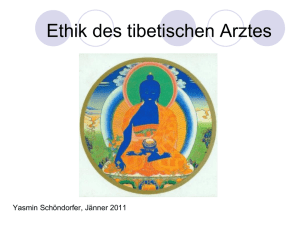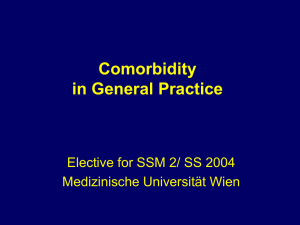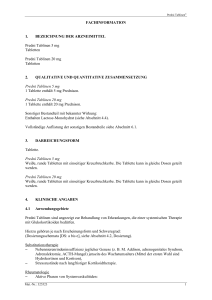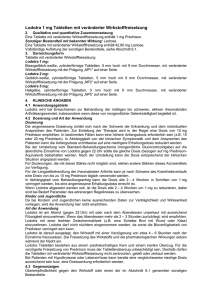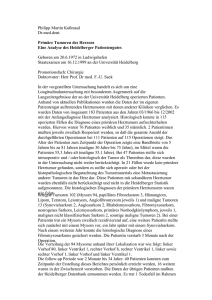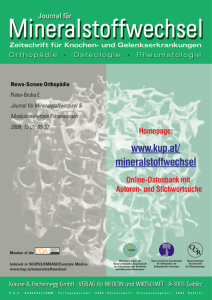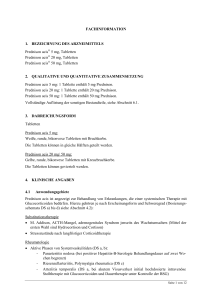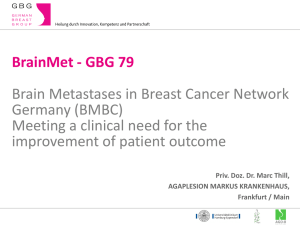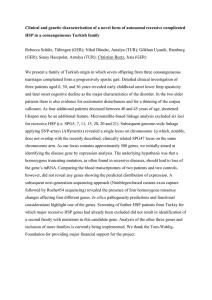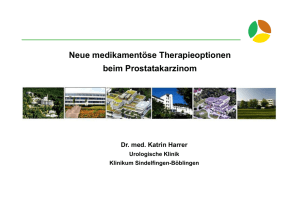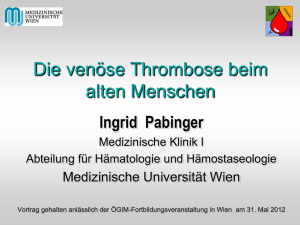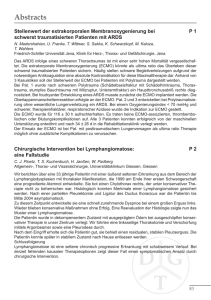in the treatment of acute exacerbations of - ETH E
Werbung
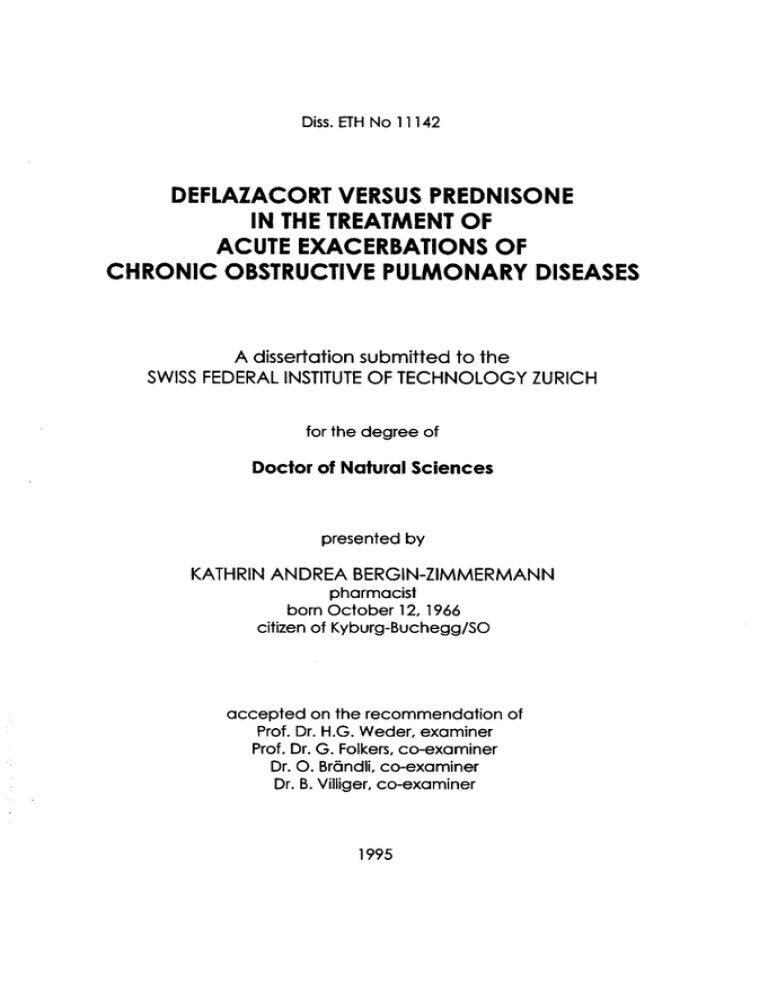
Diss. ETH No 11142 DEFLAZACORT VERSUS PREDNISONE IN THE TREATMENT OF ACUTE EXACERBATIONS OF CHRONIC OBSTRUCTIVE PULMONARY DISEASES A dissertation submitted to the SWISS FEDERAL INSTITUTE OF TECHNOLOGY ZURICH for the degree of Doctor of Natural Sciences presented by KATHRIN ANDREA BERGIN-ZIMMERMANN pharmacist born October 12,1966 citizen of accepted on Kyburg-Buchegg/SO the recommendation of Prof. Dr. H.G. Weder, examiner Prof. Dr. G. Folkers, co-examiner Dr. O. Brandli, co-examiner Dr. B. Villiger, co-examiner 1995 Summary This study has been performed in order to compare the therapeutic efficacy and tolerability of the two drugs, deflazacort and prednisone, in the short term management of exacerbations of chronic obstructive diseases (COPD's). pulmonary 62 patients, hospitalized due to an acute exacerbation of a COPD (32 in the prednisone group, 30 in the deflazacort group), were entered into this double-blind, randomized, parallel group multicenter study. During two weeks they were treated with a fixed daily dose of either 50mg prednisone or 60mg deflazacort (25mg/30mg in those patients with a body weight below 50kg) in addition to their currently prescribed antiasthmatic medication. Parameters of efficacy comprised lung function tests (FEV1, PEFR and FVC) and the physician's appraisal of the following symptoms cough, expectoration and breathlessness. Parameters of safety consisted of laboratory parameters (Ca, paCO2, paO2, pH), a glucose tolerance test (GTT), reported side effects and a final appraisal by the physician. A final qualitative evaluation of efficacy and safety has been performed by the treating physician. - There was no statistically significant difference in demographic data baseline values between the two patient groups. Both groups, deflazacort and prednisone, showed a and significant improvement of both, lung function and clinical symptoms, after 7 and 14 days. Side effects were observed in four patients in the prednisone group (waterretention, hypertension, increased appetite and herpes infection) and in patients in the deflazacort group (sleeplessness, nervousness, hypertension). After the glucose tolerance test, significantly more patients the prednisone group (n 22) showed a pathological blood sugar level in comparison to the deflazacort group (n 11). The other laboratory in the two patient groups. different not were parameters significantly three = = The results of this same dose efficacy study showed in the treatment of that an prednisone and deflazacort have the COPD, using a acute exacerbation of equivalence of 1 :1.27. Deflazacort however significantly less than prednisone. metabolism affects the glucose in Zusammenfassung Ziel dieser Studie war, die von und Vertraglichkeit Kurzzeitbehandlung bei obstruktiven Lungenkrankheiten (COLK) zu therapeutische Wirksamkeit Deflazacort und Prednison in der Exazerbationen von chronisch vergleichen. 62 hospitalisierte Patienten (Prednison N = 32, Deflazacort N einer Exazerbation einer COLK wurden in einer = 30) mit doppel-blinden, Parallelgruppenstudie wahrend 2 Wochen zusatzlich zu ihrer Behandlung mit einer fixen taglichen Dosis von 50/60mg Prednison/Deflazacort (25/30mg bei einem Kbrpergewicht unterhalb 50kg) randomisierten antiasthmatischen behandelt. Wirksamkeitsparameter waren Lungenfunktionspriifungen (FEV1, PEFR und FVC) und die Bewertung der Symptome Husten, Auswurf und Atemnot. Die Vertraglichkeit wurde anhand von Laboruntersuchungen (Ca, paCO2, paO2, pH), einem Glukose-Toleranz-Test (GTT) und der Auflistung der beobachteten Nebenwirkungen beurteilt. Abschliessend folgte eine qualitative globale Beurteilung von Wirksamkeit und Vertraglichkeit durch den behandelnden Arzt. demographischen Daten und Ausgangsbefunde waren in beiden Behandlung mit Prednison bzw. Deflazacort kam es in beiden Gruppen nach 7 und 14 Tagen zu einer signifikanten Verbesserurtg der Lungenfunktionsparameter und der uber einen Score bewerteten klinischen Symptomatik, signifikante Unterschiede Die Gruppen vergleichbar. Unter der zwischen den Gruppen bestanden nicht. Arzneimittelwirkungen wurden bei 4 Patienten in der Prednison- (Wasserretention, Hypertonie, Appetitsteigerung, Herpes Infektion) und 3 Patienten in der Deflazacortgruppe (Schlaflosigkeit, Nervositat, Hypertonie) beobachtet. Im GTT zeigten signifikant mehr Patienten nach der Prednisontherapie (N 22) eine pathologisch veranderte Glukose-Toleranz im Vergleich zur Deflazacorttherapie (N 11). In den anderen Laboruntersuchungen wurden keine Gruppenunterschiede Unerwunschte = = beobachtet. Nach den Verhaltnis vorliegenden von Daten sind Prednison und Deflazacort in einem 1 :1.27 in der Therapie wirksam. Deflazacort hat jedoch einen Glukosehaushalt. der Exazerbation einer COLK geringeren Einfluss auf den gleich
